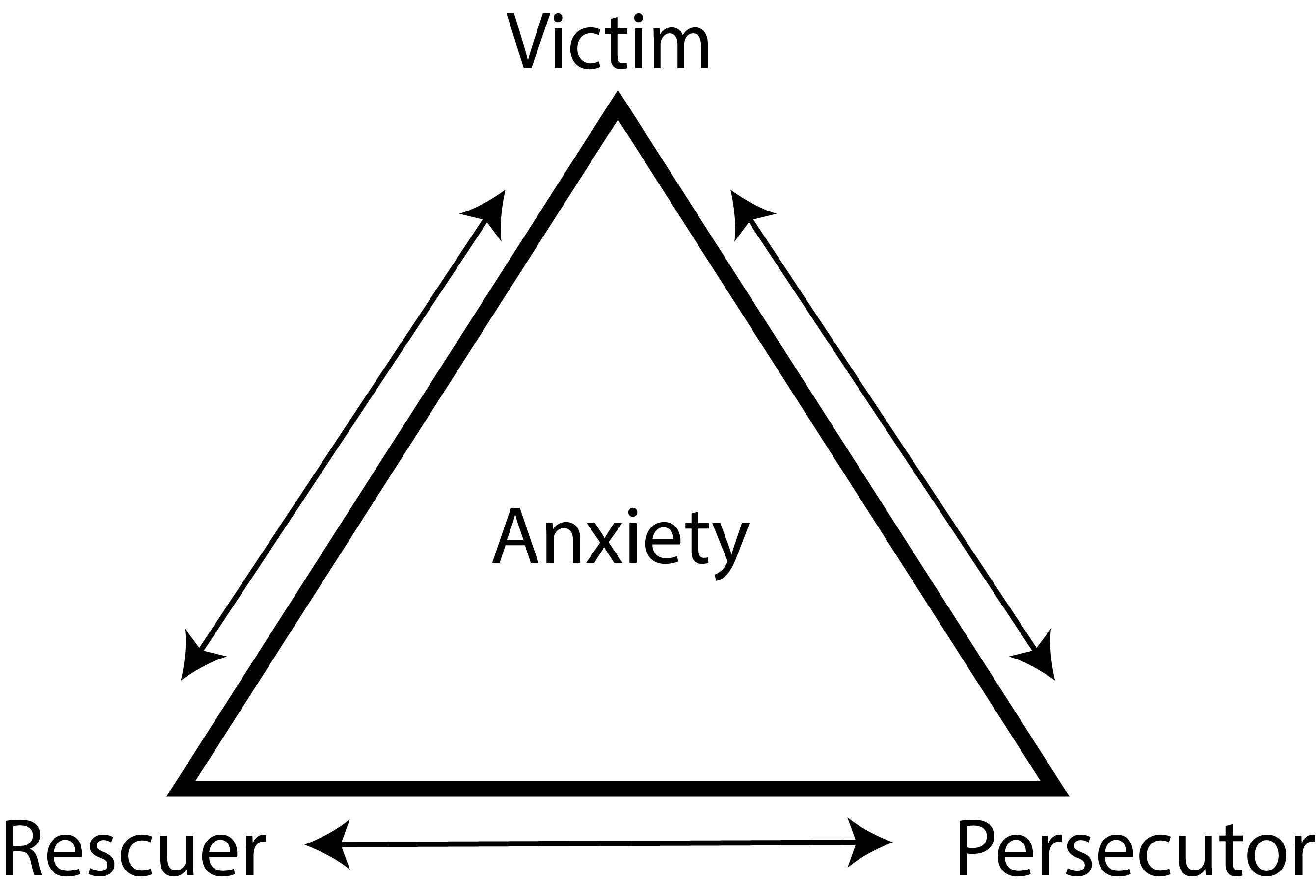
“Keep your attention focused entirely on what is truly your own concern, and be clear that what belongs to others is their business and none of yours.” ~Epictetus
Are you addicted to drama? I was, but I didn’t know it. I thought I was just responding to life, to what was happening. I really didn’t think I had a choice! The drama triangle is so pervasive, and can be so subtle, that it just seems normal. But it’s not, and there’s a much saner way to live, I found.
Dr. Stephen Karpman first described the drama triangle in the 1960’s.

All three of the roles—Victim, Rescuer, and Persecutor—are very fluid and can morph easily into one another. We all have a favorite (usually the role we assumed most often in childhood), but most of us are pretty good at all three of them, depending on the situation.
My personal favorite was Rescuer, although I also did a very credible Victim from time to time. I was a Rescuer in my family of origin (middle children often are). I felt virtuous, strong, and necessary when other people turned to me for help or depended on me to take care of things.
But there’s always a downside. Being a perpetual Rescuer led to chronic stress, as I constantly monitored how everyone else was doing and was never available to take care of my own needs.
That’s when I’d slip into the Victim role: I’d feel sorry for myself, since no one seemed to appreciate how hard I was working to take care of them. Which made me feel angry and resentful, and before I knew it I’d find myself picking a fight with my husband or fuming at some unwitting clerk. (Yep, there’s the Persecutor.)
See how the drama cycles from role to role? They all have their payoffs too. It feels good to be a Victim, at least for a while. We get a lot of attention. We don’t need to take responsibility for our actions and their consequences, because we can always find someone else to blame for them. Often people will help us (those nice Rescuers).
And being the Persecutor can feel powerful, especially for someone who has never learned the skill of asking directly for their needs to be met. We get to “blow off steam.” We might even get to have our way for a while—but at what cost?
It’s an exhausting way to live. All of the roles are driven by anxiety and the ways we have learned to “control” it in our lives. The drama keeps us absorbed, and it keeps us enmeshed (unhealthily) with others, but it leaves very little room for real peace and joy. And no room at all for a truly healthy relationship to form.
But how do we step away from the drama triangle, when almost everyone we know is still playing the game?
The first step is simply to be aware of the game, how it works, and what roles you play most frequently. What role did you play as a child? Can you identify the roles that others in your family played? Are they still playing them?
The role of Rescuer may be the easiest to admit to, since it actually sounds praiseworthy or noble on the surface. This is not genuine philanthropy, however—it’s really about control and being in someone else’s business, thus neglecting your own.
If you’re accustomed to being a Victim, on the other hand, you’ll find yourself often looking for someone or something outside of yourself to blame. (In fact, the hallmark of all the roles is that your attention is usually directed outward.)
Finally, although no one likes to admit to being a Persecutor, if anger is your go-to emotion when things go wrong, you’re probably operating in that role. In reality, the anger is just a mask for underlying fear, shame, and powerlessness. Sadly, adult Persecutors were often Victims as children. In the drama triangle there are no good guys and bad guys—everyone loses.
Once you’ve become aware of your patterns, it becomes much easier to recognize the game and, eventually, step out of it. Since the drama triangle is all about being in other people’s business, stepping out of it requires you to remain firmly in your own!
What helped me with this was a concept I call the “zone of integrity.” Imagine a circle around yourself; this represents your business (your true responsibility). In the zone of integrity, you are responsible for being 100 percent honest, both with yourself and with others. This means acknowledging and honoring your own feelings and needs, and allowing others to be responsible for theirs.
It also means taking responsibility for your own actions and their consequences, and letting others do the same. This might require some “tough love,” both toward yourself and others. You might not be the most popular person at the dance for a while. Codependence (which is essentially what the drama triangle describes) is a system. It requires multiple players to function, so people will probably be upset when you opt out. In fact, you can count on it.
During my own withdrawal phase, I would regularly find myself getting sucked into the old dynamics, but it’s become easier and easier to spot when that happens and to use the “zone of integrity” concept to pull myself back into my own business.
Recently my mother asked me to help smooth over a squabble between some of my siblings—exactly the sort of thing I have done all my life. Even in the act of saying yes I suddenly stopped and thought, “Is this really my business? Do I really have to take this on?” And then politely declined.
It’s not always easy in the beginning to recognize whose business you’re in, especially when it involves your family of origin. These are the people who taught you most of what you know about the drama triangle, after all!
For me, I feel a very familiar sense of obligation and guilt when those Rescuer urges start kicking in, which prompts me to pull back and look more closely at the situation. It took practice for me to hear and trust those feelings, but now they’re easy to spot.
The zone of integrity, when I manage to stay there, feels so good. I still care about people, and help when it feels right, but I no longer feel obligated to rescue. That means that I don’t end up feeling victimized, or resentfully persecuting someone else in return. In the long run it’s much better for everyone involved.
My life now has a lot less drama, it’s true. You might miss that sometimes, when people are trading war stories at Friday night happy hour. What you will have instead is true peace of mind, much healthier relationships and a passionate addiction to staying in your zone of integrity. It’s worth the trade-off.
![]()
About Amaya Pryce
Amaya Pryce is a life coach and writer living in the Pacific Northwest. Her books, 5 Simple Practices for a Lifetime of Joy and How to Grow Your Soul are available on Amazon. For coaching or to follow her blog, please visit www.amayapryce.com.
Get in the conversation! Click here to leave a comment on the site.
The post How to Step Out of the Drama Triangle and Find Real Peace appeared first on Tiny Buddha.
from Tiny Buddha https://ift.tt/2t7Y3aQ